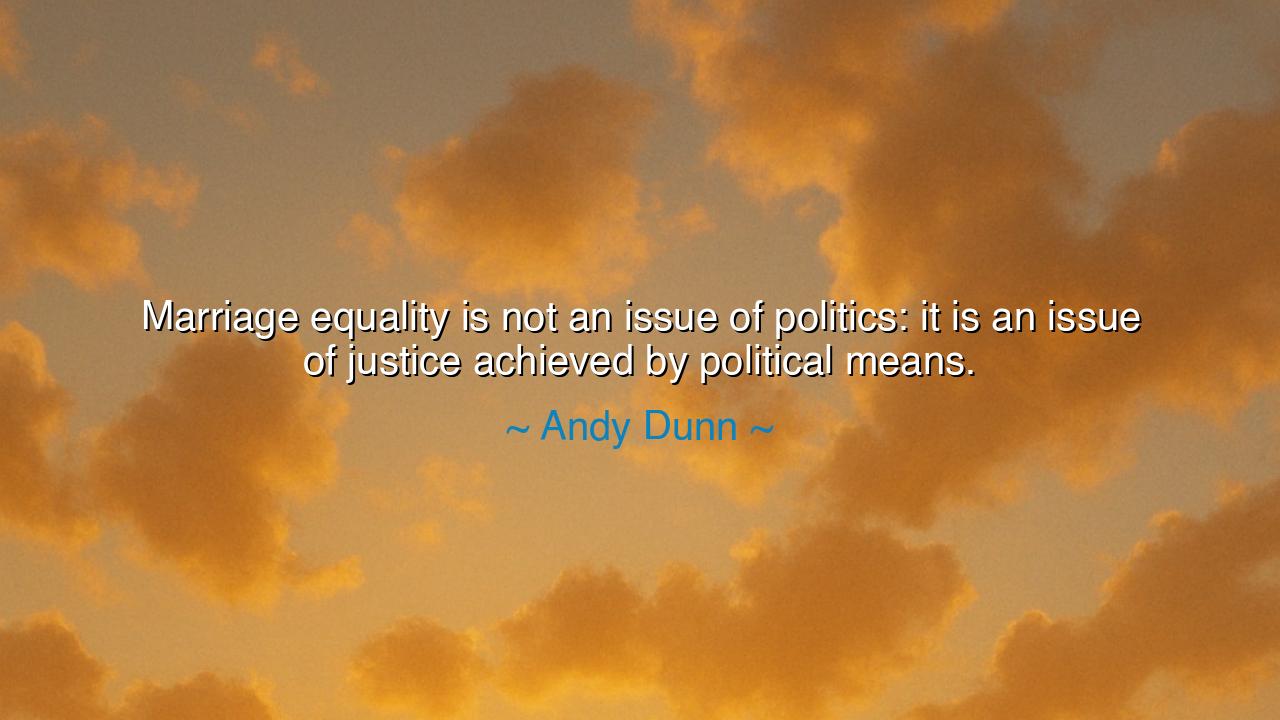
Marriage equality is not an issue of politics: it is an issue of
Marriage equality is not an issue of politics: it is an issue of justice achieved by political means.






"Marriage equality is not an issue of politics: it is an issue of justice achieved by political means." These words by Andy Dunn strike at the heart of the struggle for justice, reminding us that the fight for marriage equality is not merely a political debate, but a moral imperative that seeks to ensure the fundamental rights and dignity of all people. The battle for the right to marry, regardless of sexual orientation, is not about partisan divisions, but about the pursuit of a just society—one in which every individual, regardless of who they love, is treated with the same respect and afforded the same legal rights as anyone else.
In the ancient world, the idea of justice was foundational to philosophy, particularly in the writings of Plato and Aristotle. Both philosophers explored the concept of justice as a virtue that must be pursued for the welfare of society. Plato, in his Republic, envisioned a society where each individual was given their due based on their abilities and contributions. He argued that justice in the individual mirrored justice in the state, and it was only through the fair treatment of all that a just society could be achieved. In a similar vein, Andy Dunn emphasizes that marriage equality is not a political game to be played for party victories, but a fundamental human right that transcends political ideologies. To deny same-sex couples the right to marry is to reject the very principles of justice that form the bedrock of any fair society.
Consider the Civil Rights Movement in the United States, where leaders such as Martin Luther King Jr. fought not for political power, but for the rights and dignity of African Americans. King’s vision for equality was one of profound moral clarity, where laws and social systems needed to reflect the fundamental equality of all people. His fight was not about politics, but about the justice that was owed to a group of people who had been oppressed and denied basic rights. Like marriage equality, the civil rights struggle was framed as a matter of justice, with political action being the means to achieve the righteous end.
The struggle for marriage equality in modern times draws upon the same principles. Same-sex couples have fought not just for the right to marry, but for the recognition and validation of their love and commitment. This battle has been won in courtrooms and legislatures around the world, where laws have been reformed to reflect the fundamental equality of all people, regardless of whom they choose to love. The Supreme Court ruling in Obergefell v. Hodges in 2015, which legalized same-sex marriage across the United States, was a monumental moment in the fight for justice, confirming that love should not be restricted by political ideologies or societal norms, but should be celebrated as a fundamental human right.
The lesson from Dunn’s words is clear: marriage equality is not just a political issue; it is a moral cause rooted in the pursuit of justice. To see it as anything less is to diminish the value of human dignity and the rights of individuals to live their lives without fear of discrimination. Just as Dr. King and countless others fought for civil rights, we must continue to fight for the rights of LGBTQ+ individuals. Political means may be the tools to achieve this justice, but the end goal is not just political victory, but the creation of a society where all people are seen as equal in love, value, and worth.
In our own lives, we must commit to standing for justice in all its forms. Whether in the fight for racial equality, gender equality, or marriage equality, we must understand that these struggles are not about gaining political leverage, but about securing the fundamental human rights that every person deserves. Let us take up the mantle of justice, and, like those who have fought before us, use political means to ensure that equality is not just a dream, but a reality for everyone. We must continue to push for legal reforms that reflect the truth that all people, regardless of their sexual orientation, should be able to marry the one they love and have their love recognized with equal rights.
Let Andy Dunn’s words serve as a reminder that marriage equality is a matter of justice, and justice is something worth fighting for—through political action, social advocacy, and a deep commitment to the values of love, respect, and equality. In doing so, we will create a future where everyone, regardless of who they love, can live with the same rights and privileges as any other person. The battle is not over, and we must continue to fight, always keeping in mind that this is not just about politics, but about the fundamental dignity of the human spirit.






AAdministratorAdministrator
Welcome, honored guests. Please leave a comment, we will respond soon